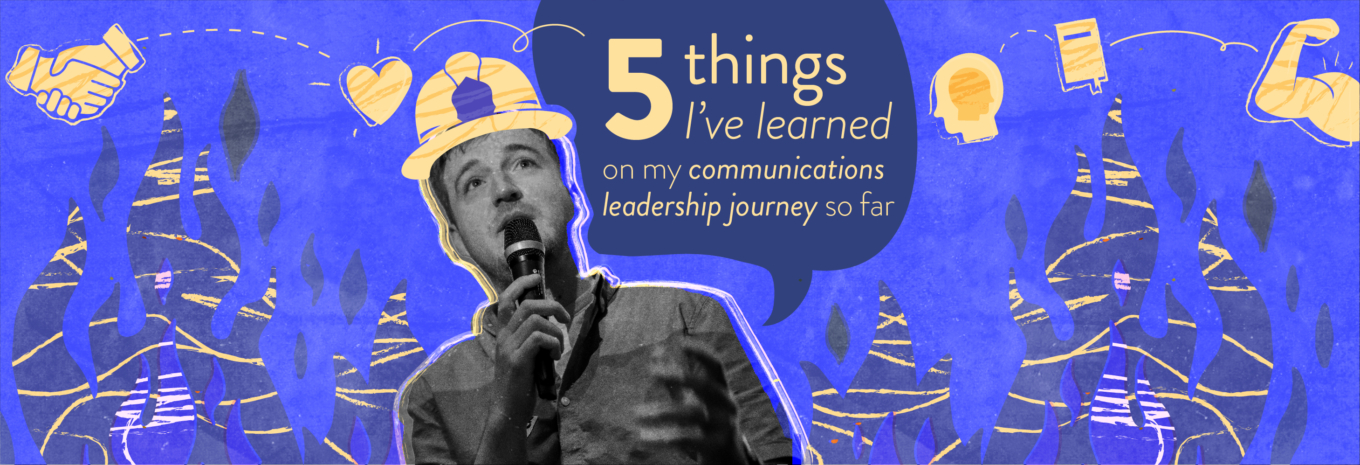Time flies when you’re having fun, right?
It’s around six years to the day I first threw my hat in the ring for a temporary leadership role – within my then team at Nottinghamshire Fire & Rescue Service.
While others might opt to send a polite email, or raise it as part of a 1-2-1 meeting, I opted for a more unconventional method, and offered myself up for the role during a conversation with one of our senior leadership team…as we stood side by side at a urinal.
Looking back, it wasn’t one of my finest moments.
Six years later, and via a fantastic stint at South Yorkshire Fire and Rescue and as a graduate of LG Comms’s Future Leaders programme, I’m now finally into a leadership role at Nottinghamshire and chair of the FirePRO network for fire comms.
Here’s what I’ve learned so far…
1. Respect is earned in the trenches 
Much of good management and leadership is about moving away from the feeling you must do everything yourself – because you can’t.
However, it’s important not to move TOO far away, especially if you move into a new team. Why? Because respect is earned, not automatically given.
Whether you are trying to win the trust of your direct reports, or colleagues within your Senior Leadership Team, you need to show them what you’re capable of, and what you can bring to that particular table.
When your team needs help, get involved! And then evaluate your work, so that senior colleagues can see your worth.
2. Honesty is ALWAYS the best policy 
Honesty is important and a fundamental part of organisational ethics, behaviours and values.
But this is not about honesty in general, it’s how you manage those difficult conversations.
Whether it be responding to an ask for advice, offering feedback on performance or saying that difficult (but much-needed) ‘no’ to low priority requests, honesty should be the only policy.
Thinking about the long-run, this will earn you so much more respect, and make life much easier if you’ve made you expectations and feelings clear.
Just remember – respecting colleagues and being conscious of their feelings is important, too. Honesty and warmth absolutely can, and should, go together!
3. Your team knows more than you
Having left Nottinghamshire Fire & Rescue in August 2018, I’ve recently returned after a five-year stint in South Yorkshire.
There are similarities between services, and I’ve got historic knowledge from my first time here. But I am still, essentially, a new guy.
Over the last three months I have leaned heavily on my excellent team, who have helped me get back up to speed. And I don’t think that will change anytime soon.
That’s because on a day-to-day basis, they are out in the aforementioned trenches, working across the wide range of stations and sites we have in Nottinghamshire.
As much experience as you may have, never forget that the ‘boots on the ground’ are living and breathing your communications every day.
The result? More often than not, they probably know more than you.
4. You need to manage yourself, first 
Now it’s time to be a hypocrite.
While it’s important to get in the trenches to earn respect, it’s also important to manage yourself and, importantly, your own time and wellbeing.
Collaboration with colleagues across different departments is an essential part of delivering gold standard work, but award-winning work isn’t produced in meeting rooms by burntout communicators.
When it comes to managing yourself, remember to lead by example. Own your diary, keep time free for important work, and advocate proper prioritisation. Then, help your team do the same thing.
5. There’s no time like the present
So, let’s talk about the urinals.
When I popped the question around the possibilities of me stepping up into a management role, six years ago, was I ready? Probably not.
But whether it’s a promotion, the launch of a new campaign, or proposing some changes, the chances are you will never feel ready.
As a leader it’s important for you, more than anyone, to show the courage to step up and drive things forward – even if it feels a little bit scary.
This is your time!
Jack Grasby is Senior Communications Manager at Nottinghamshire Fire & Rescue Service, and Chair of FirePRO, the network for fire service communicators across the country. Until recently he was Campaigns Manager at South Yorkshire Fire & Rescue.
















